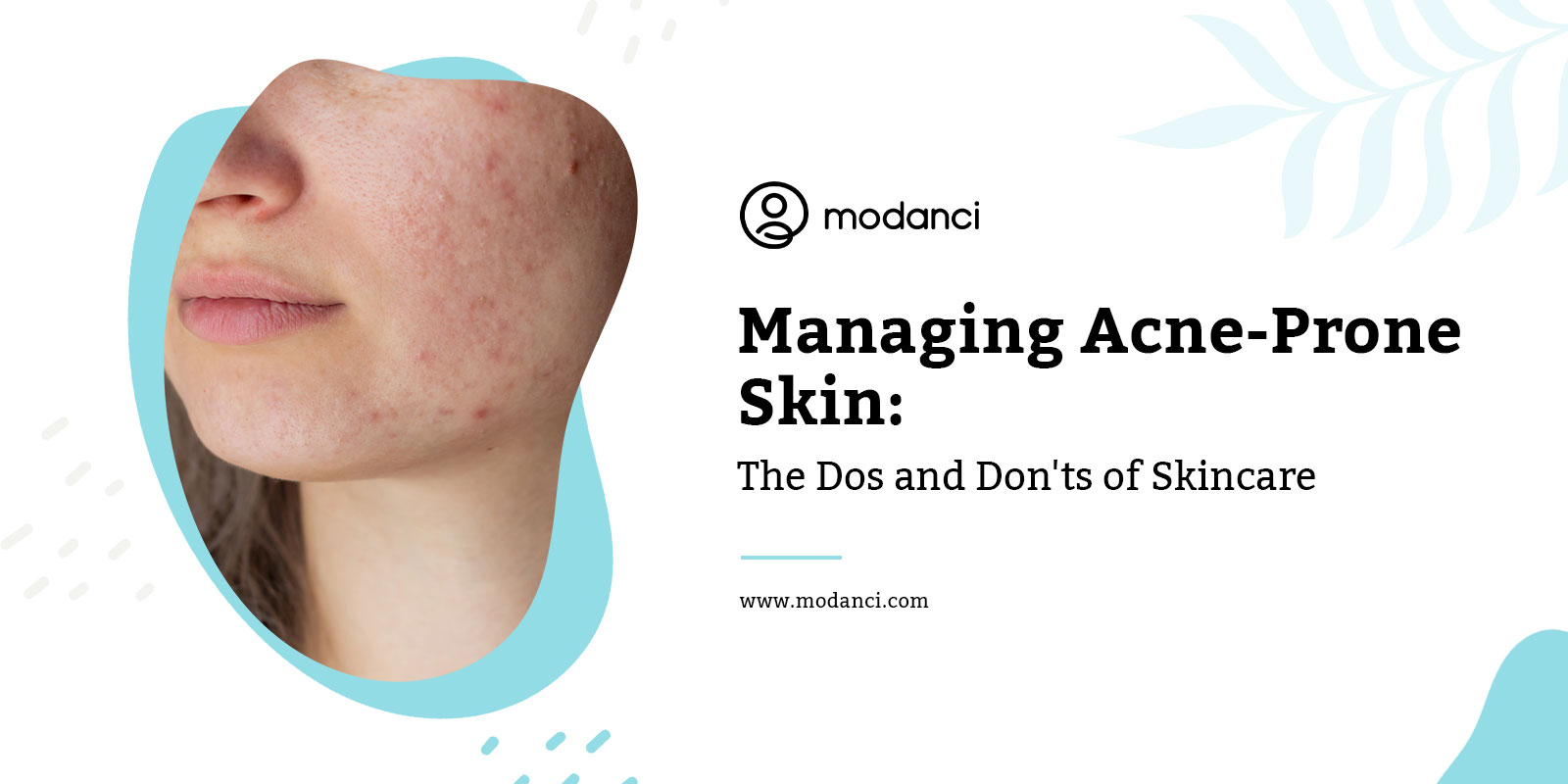Acne is commonly associated with adolescence but can occur at any age. Turning 20 doesn’t mean acne magically disappears. Acne can develop due to genetics, lifestyle choices, and hormonal fluctuations.
Knowing your skin type and the specific type of acne is crucial for adequate care. Tailoring a personalized lifestyle and skincare routine based on these factors can be beneficial.
Caring for acne-prone skin involves more than just using products that target blemishes. It may require lifestyle adjustments, with an improved skincare routine as the initial step. However, before delving into Skincare Dos and Don’ts, let’s better understand acne and its causes.
What are the causes of Acne?
The pilosebaceous unit, which is responsible for maintaining healthy skin, can be disrupted by hormonal changes. This disruption can cause an increase in sebum (oil) production and the buildup of dead skin cells, leading to blocked hair follicles and the formation of comedonal acne.
When comedonal acne becomes infected by bacteria called Propionibacterium acnes, it can transform into a more severe type of acne characterized by inflammation, such as pustules or nodules. The presence of pus within the hair follicles is a result of the immune system’s response, as it sends white blood cells to fight the infection.
According to Ayurveda, the balance of Doshas (life energies) in your body can be affected by various internal and external factors, leading to skin problems such as acne. The occurrence of acne, known as “Yuvana Pidakas” in Ayurveda, is attributed to an imbalance of the Vata, Pitta, and Kapha Doshas, which in turn affects the blood (Rakta dhatu) and muscles (mamsa dhatu). Severe acne cases may involve the formation of pus (rasavaha). An imbalance of Vata and Pitta results in increased keratinocytes, while excess Kapha leads to excessive sebum secretion. This leads to the blockage of skin pores and the subsequent formation of acne.
Knowing Your Skin-type
Understanding your skin type is essential for selecting suitable skincare products and avoiding potential issues. You can use the following guidelines to identify your skin type, but seeking assistance from a dermatologist or Ayurvedic physician can also be helpful if you’re uncertain:
Dry
Dry skin often feels tight and appears flaky.
Oily
Oily skin tends to have a shiny appearance by the end of the day.
Combination
Combination skin has dry and oily areas, with the T-zone (forehead, nose, and chin) usually being the oily region.
Sensitive
Sensitive skin easily reacts to products and is prone to rashes, discolouration, or irritation. It can coexist with any of the above skin types.
While oily skin is generally more susceptible to acne, pimples can affect anyone. Knowing your skin type makes choosing an acne regimen that effectively clears your skin easier.
If you have sensitive, acne-prone skin, using too many products with active ingredients (such as a salicylic acid wash, exfoliating toner, and retinol cream) can damage your skin barrier and lead to more breakouts.
For individuals with oily skin, using a moisturiser designed for dry skin may be overly occlusive and result in clogged pores.
The ‘Do’s and Don’t s of Skincare
Dos
- Cleanse your face twice daily and after sweating to maintain a healthy routine. Washing more than twice a day, unless you’re sweaty, can irritate the skin. Use a gentle cleanser suitable for your skin type and follow up with a moisturizer to keep your skin balanced.
- Regularly clean items that come in contact with your skin, such as bedding, makeup brushes, and phone screens, as they can harbor pore-clogging debris. Change sheets weekly, pillowcases two to three times a week, and clean makeup tools daily or weekly. Wipe phones with a cleanser once or twice a day to remove bacteria and oil buildup.
- Choose non-comedogenic products labeled as oil-free or non-acnegenic to prevent clogged pores. However, it’s essential to check the complete ingredient list for irritants like alcohol or fragrance, as these can potentially trigger breakouts or sensitivity in some individuals.
- Evaluate your hair care routine, as hair products can cause breakouts on the forehead and neck. Opt for hair products that are labeled as non-comedogenic or formulated specifically for acne-prone skin. Avoid using oil-based products and keep your hair off your face, especially at night, by using a headband or tying it back.
- Stay hydrated, as it may help regulate excess oil production. Although research is limited, following the 8×8 rule (eight 8-ounce glasses of water per day) is a good guideline for most individuals. Adequate hydration can contribute to overall skin health.
Don’ts
- Avoid harsh scrubbing or using aggressive exfoliants. Acne is not caused by dirt, so scrubbing harder won’t help and can worsen redness and irritation. Instead, opt for gentle exfoliation methods, such as chemical exfoliants containing ingredients like salicylic acid or glycolic acid.
- Resist the urge to pick or pop pimples to prevent scarring and further inflammation. If necessary, practice safe extraction methods with warm compresses to help bring the pimple to a head, followed by using clean tools or seeking professional help from a dermatologist or esthetician.
- Avoid excessive exfoliation. Although it may be tempting to scrub acne-prone skin vigorously, overdoing it can remove essential oils, exacerbate irritation, and worsen breakouts. Stick to a gentle exfoliation routine once or twice a week, depending on your skin’s tolerance.
- Don’t expect instant results. Acne treatments and natural remedies typically take time to show noticeable improvements. It’s important to be patient and consistent with your skincare routine. It may take six to eight weeks or longer to observe significant changes in your skin.
- Minimize heavy makeup usage. Heavy makeup, particularly oil-based products, can clog pores and contribute to acne. Such products also restrict the skin’s ability to breathe. Opt for lighter, non-comedogenic formulations or consider using mineral makeup that is less likely to clog pores. If possible, allow your skin to breathe by going makeup-free on some days or during your skincare routine.
When should you consult an Ayurvedic Vaidya?
Acne can have multiple causes; if it doesn’t improve with home remedies, it’s recommended to seek professional help from an Ayurvedic Vaidya or dermatologist. Persistent acne could be a symptom of underlying conditions that require medical attention. Moderate to severe inflammatory acne is best treated by an expert, as it carries a higher risk of scarring and potential facial disfigurement.
FAQs
1. What are some key skincare dos and don’ts for managing acne-prone skin?
Cleanse your face twice daily and after sweating to maintain a healthy routine. Washing more than twice a day, unless you’re sweaty, can irritate the skin, and avoid picking or popping pimples.
2. How can over-washing or under-washing affect acne-prone skin?
Excessive face washing can have adverse effects on your skin. Washing your face too often can remove the natural oils and moisture, resulting in dryness, irritation, and possibly acne. And inadequate cleansing of the face can result in acne due to the accumulation of sweat, dirt, or oils in the pores.
3. How can a consistent skincare routine help prevent acne?
Consistency is vital when it comes to skincare. While we often desire immediate results and are tempted by quick fixes, maintaining healthy skin requires patience and dedication. Establishing a reliable skincare pattern is essential, even if occasional changes are made.
4. How can I prevent acne scars from forming?
To prevent acne scars, follow these guidelines:
- Avoid picking or popping pimples
- Seek early treatment from an expert.
- Allow acne to heal naturally without interference. Avoid picking scabs, as they aid in safe healing and protect the skin from infections.
- Avoid excessive exfoliation during acne breakouts.
Read More:
- 21 Effective Home Remedies for Soothing Skin Rashes Naturally
- Say Goodbye to Dryness: 12 Effective Home Remedies for Dry Skin
- 10 Natural Home Remedies for Glowing Skin: Tips for a Healthy and Radiant Complexion
- Clear Skin Ahead: Tips and Tricks for Getting Rid of Acne
- Glowing Skin Naturally: How to Remove Acne Scars and Reveal Your Beauty




